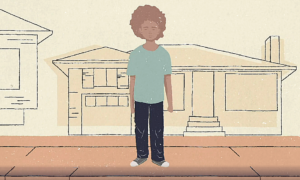
WASHINGTON — A bipartisan group of federal lawmakers want to reduce the time foster youth spend waiting for a placement across state lines.
The House approved by voice vote Tuesday legislation that would provide $5 million in grants to help states and counties join a web-based case processing system to exchange data and documents.
Too often, children languish for months in foster care awaiting a placement while states gather and mail reams of documents back and forth, said supporters of Modernizing the Interstate Placement of Children in Foster Care Act (HR 4472).
“When the bond between parent and child has been broken, and children cannot safely return home, they deserve to be placed in the setting that is best for them, regardless of whether that is a home within their state or across a state line,” Rep. Todd Young, R-Indiana, the lead sponsor of the bill, said in a news release.
Interested states would participate in the National Electronic Interstate Compact Enterprise (NEICE), which was developed to modernize the administration of the Interstate Compact on the Placement of Children.
NEICE, designed by the American Public Human Services Association and its affiliate, the Association of Administrators of the Interstate Compact on the Placement of Children, launched in 2014 in six pilot states. On average, participating states reduced wait times for a child to be placed in a home in another state by 30 percent — and reduced the time it takes to identify a family for a child from 24 business days to 13 business days, according to a congressional report on the bill.
The legislation also would require all states to participate in an electronic interstate case-processing system by Oct. 1, 2026.
Sen. Charles E. Grassley, R-Iowa, is the lead sponsor of companion legislation in the Senate (S 2574).
The groups implementing NEICE welcomed the legislation and said the system will be useful beyond improving placement times.
“Once fully operationalized, the NEICE will also be a valuable tool for addressing societal challenges that put children at risk, including the opiate and heroin epidemic, illegal rehoming of children, and sex trafficking,” they wrote in a letter to the bill’s sponsors.
Vivek S. Sankaran, director of the Child Advocacy Law Clinic and the Child Welfare Appellate Clinic at the University of Michigan Law School, said the legislation is a welcome improvement.
“Decisions will be made more quickly, which is a plus. We’re stuck in the Stone Age in a lot of states,” he said.
But the bill would not address underlying problems Sankaran sees in the system, such as the lack of clear standards for evaluating a potential placement and an appeals process.
“It doesn’t solve the fundamental problem,” he said.
Child welfare oversight for infants
On Wednesday, another bipartisan group of lawmakers introduced the Improving Safe Care for the Prevention of Infant Abuse and Neglect Act (HR 4843), which aims to ensure states protect infants born with exposure to illegal drugs.
The legislation would require the Health and Human Services Department (HHS) to ensure states are adhering to the Child Abuse Prevention and Treatment Act. States are required to have health care providers notify child protection agencies when an infant is born affected by illegal substance abuse or withdrawal symptoms. States also must develop a “safe care plan” for each child.
Not every state is following the law, said the bill’s sponsors, citing a recent Reuters investigation into infant deaths due to opioids.
“We are failing some of our most vulnerable children and families,” Education and the Workforce Committee Chairman John Kline, R-Minnesota, said in a news release. “An unwillingness to follow and enforce the law has led to shocking and even deadly consequences. We have a moral responsibility to do better.”
Under the legislation, HHS would review state policies, provide information on best practices and require additional reporting on infants born with illegal substance exposure and their care.





























